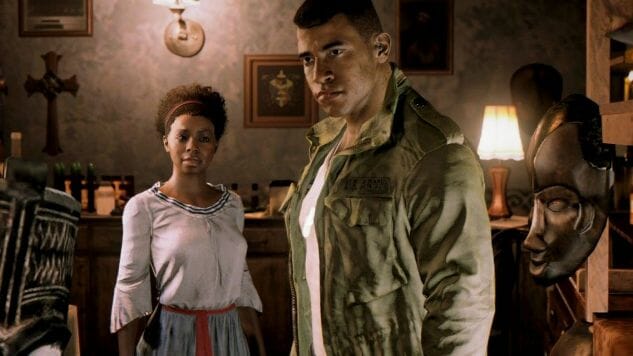Mafia III: Catharsis Through Extreme Violence

Revenge tales are a dime a dozen. It’s a well-worn story trope that’s been used in videogames almost from the beginning. For me, these stories never felt truly important. They were a means to an end, way stations between gameplay segments. But Mafia III is different.
The game starts you off in the racially turbulent time of 1968. Set in the faux-New Orleans city of New Bordeaux, you’re put in the combat boots of Lincoln Clay, a black biracial orphan returning from the Vietnam War. He’s reunited with his adoptive family of Sammy and Ellis Robinson, and the man who raised him in the orphanage, Father James. Sammy is the leader of the Black Mob, currently indebted to another mob headed up by Sal Marcano.
There’s a line in the song “Get It” by Run The Jewels in which Killer Mike raps “So even if you got seven figures, you still a nigga,” and that’s a good description for most of the story in Mafia III. No matter how much power you have, how much money you accrue, the kind of allies or friends you have, you’re still viewed by your skin color. In the first mission of the game Lincoln is going undercover as a bank security guard and is being briefed that even though his partner will be acting friendly towards the other security, he means nothing he says. Lincoln responds with “It’s not like I haven’t been called a nigger before.” And that statement resonated with me. Because it’s true and blatant. Ask any black person you know, no matter what walk of life, whether it’s in person or on the internet: they have been called a nigger before.
As I stated before, this game takes place in 1968. The game is steeped in the style of the ‘60s. Clothing, hairstyles, the music, the aesthetic are all very much of this era. You can overhear NPCs referring to the assassination of Martin Luther King Jr. I had NPCs tell me “You don’t belong here boy.” The game will throw up a visual indicator of when the police are watching you, even when you’re not committing a crime. I’d be lying if I said I’ve never felt the watchful eyes of someone on me solely because I have a certain skin color, if I said that, much like Lincoln Clay in New Bordeaux, I didn’t feel uncomfortable in rich white areas because I didn’t feel like I belonged or was wanted.
But unlike real people, Lincoln handles racism with force. After being betrayed by the Marcano family and having his only family murdered, he sets out to get revenge. He raises hell up and down this city, taking over, and murdering without mercy. And I’m not going to say it’s not cathartic. Having an NPC say to me “What are you going to do, nigger?” and Lincoln slitting his throat, stabbing him in the chest, and throwing aside his body as if it was trash is extremely cathartic.